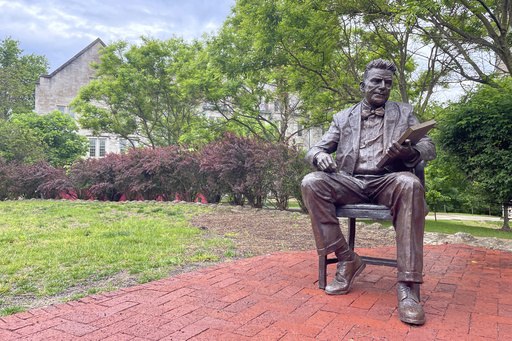INDIANAPOLIS (AP) — Indiana University’s board of trustees abandoned a proposal to turn the Kinsey Institute into a nonprofit Friday, dispelling monthslong uncertainty over the future of the famous sex research center targeted by Republican lawmakers.
Lawmakers blocked state dollars from going to the institute last year in a Republican-sponsored measure. The legislation prompted a highly criticized internal plan to partially split the Kinsey Institute from the university to ensure compliance with the new law.
Board members instead committed to finding another way to comply with the state law while maintaining the institute’s ties to the university.
Cynthia Graham, a senior scientist at the Kinsey Institute and a professor of gender studies, said she and many others were “greatly relieved” to hear the trustees’ decision after months of anxiety.
“This is actually the best scenario of all,” she said.
Higher education — and how its institutions instruct topics such as gender, sexuality and race — has become a frequent target of GOP state lawmakers across the country.
Indiana legislators, for example, passed a bill Thursday creating regulations on faculty tenure and campus diversity, equity and inclusion programs, describing it as a way to make public universities and college campuses friendly to conservative students and professors.
Located about 50 miles (82 kilometers) from Indianapolis on Indiana University’s Bloomington campus, the institute is named after its founder Alfred Kinsey, who disrupted cultural norms surrounding sex. A wide variety of research conducted at the institute includes sexual assault prevention and contraception usage.
The institute has been the subject of repeated conservative criticism for decades. Critics blame the institute and Kinsey for contributing to a greater acceptance of homosexuality and pornography. Additionally, part of the persistent opposition stems from unfounded claims of evidence of child abuse in Kinsey’s research.
The institute’s website includes a page dedicated to “correcting misinformation” about Kinsey and the institute’s research.
In November, the board of trustees tabled a vote on whether to turn Kinsey into a nonprofit but keep its collections with the university following outcry from faculty, students and academics around the world. The possible separation of the institute from the university prompted fear over the future of its collections and even the safety of its researchers.
“We’ve really been in the dark about this and about what exactly they were going to propose,” Graham said.
The board voted Friday to forgo the original proposal. The university will instead submit a plan to the Indiana State Board of Accounts to ensure state dollars are not being provided to the institute, according to a news release.
“With the action taken today, we are taking steps to ensure that the Kinsey Institute remains a beacon of intellectual inquiry,” Indiana University President Pamela Whitten said in a written statement.
University officials said the plan will show the institute’s funding sources and demonstrate that no state appropriations are being directed to it.
The university also committed to affirm “valuable work of the Kinsey Institute, which has faced continued opposition fueled by misinformation,” the news release said.
Graham’s only remaining concern is the possibility of future attacks from state lawmakers on the institute’s operations.
“We’re much more heartened by the support that we have from IU now that really seems concrete,” she said.
This website uses cookies so that we can provide you with the best user experience possible. Cookie information is stored in your browser and performs functions such as recognising you when you return to our website and helping our team to understand which sections of the website you find most interesting and useful.
